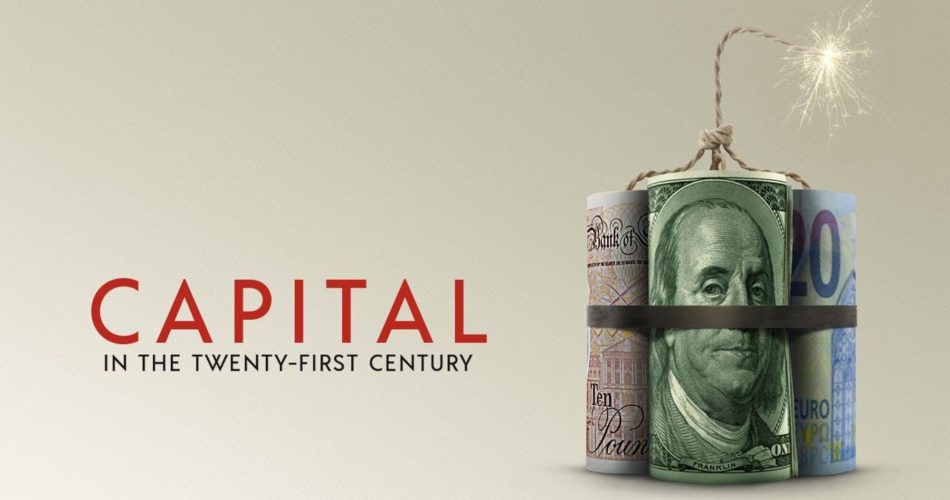 The French economist Thomas Piketty wrote a book in 2013 that became popular overnight. It presented a dim view of the current state of capitalism and suggested radical fixes which were widely deliberated around the world. Though the topic intrigued me a lot, the size of over 800 pages stopped me from reading the book “Capital in the Twenty-First Century“. Now, Director Justin Pemberton from New Zealand has made a movie of it titled “Capital in the Twenty-First Century”, and that made it convenient for me to learn about it. The film is available on these online services for a fee.
The French economist Thomas Piketty wrote a book in 2013 that became popular overnight. It presented a dim view of the current state of capitalism and suggested radical fixes which were widely deliberated around the world. Though the topic intrigued me a lot, the size of over 800 pages stopped me from reading the book “Capital in the Twenty-First Century“. Now, Director Justin Pemberton from New Zealand has made a movie of it titled “Capital in the Twenty-First Century”, and that made it convenient for me to learn about it. The film is available on these online services for a fee.
The film is made in collaboration with Thomas Piketty and includes his voice along with many other experts including British historian Kate Williams of the University of Reading, Nobel laureate economist Joseph Stiglitz, British journalist Paul Mason & Suresh Naidu, an economic historian at Columbia University. The documentary uses generously clips from various historic and sci-fi films like Elysium, Wall Street, The Grapes of Wrath, and the Pride & Prejudice to put forward its views.
It starts from how capitalism took the form we recognize from the 17th & 18th century when the colonial British and French were ruling over the world, how “Slaves” were used as collateral and capital in the Americas and how the poorest of poor migrated from Europe to escape from the clutches of the aristocracy to the new world. Then it explores the impact of the Industrial Revolution which changed the idea of capital moving from being fixed (like with land which yielded produce or rent) to getting liquid (building factories and using labour). After this, WW1 and WW2 slowly reduced the stronghold of the aristocracy, whom reluctantly yielding the capital and power to the newly emerging middle-class & the worker unions. Currently, in the last 30-40 years with the fast rise of the financial sector and technology sector, capital has again got concentrated with the elite/aristocrats who are able to use smart offshoring to avoid taxes, with the poor and middle-class losing all the gains made in the last two centuries. The super-rich can now pass the control and power through their children & future generations infinitely and rest have no way to get a piece of their wealth.
Piketty presents a view that the young today in the USA and Europe believe that even if they study hard and work tirelessly, their lives will be worse than their parents; whereas the young in Asia (India & China) believe to the opposite. To fix the large imbalance of the capital between the rich and the poor, he recommends high inheritance (estate) tax, put a cost (tax) to capital being owned by the rich every year, high taxes charged progressively and regulations to avoid the concentration of too much capital with a few.
I found the example of a psychology experiment at the University of California at Irvine done with several pairs of strangers playing Monopoly game, with one of the two in each pair being randomly selected to be the rich player and the other poor, to be interesting. Here the player who got to be rich, just because of luck, starts believing they are better, they deserve to be rich and they become rude to the poor player. Not a single winner in the entire study credited their success to the unfair advantage they got by the coin toss.
I enjoyed the various soundtracks the film has used, like: 9 to 5 by Dolly Parton, Gold Diggers of 1933 – “We’re in the Money“, Ella Fitzgerald – Don’t Fence Me In, and All that money, the money is the motive from The Morning by The Weekend.

Capital in the Twenty-First Century (2020)
After watching the film with my teenage son, we kept discussing it for the next three hours and that shows the impact the documentary on us. While I may not agree with Piketty’s prescription entirely, the current pandemic ravaging the lives of the poorest of poor disproportionately has made his diagnosis very relevant.
The current concentration of wealth with a few is turning out to be evil & the world’s poor needs to be helped urgently – how is the question, that humanity must collectively figure out! Venkatarangan



Comments